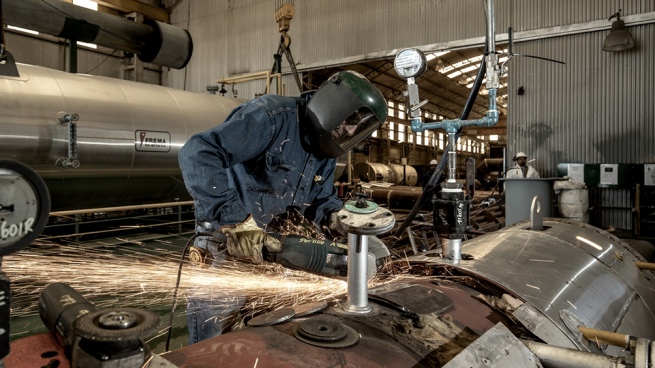The Empretec Foundation is an entity dedicated to carrying out a policy of greater rapprochement with SMEs, MSMEs and entrepreneurs, expanding the offer of training programs in a joint effort with Banco Nación.
This was highlighted in an interview with Télam the president of the Empretec Foundation, Adrián Lebendiker, who summarized the entity’s task in four axes: “training, dissemination, assistance and connection”.
It is that the world of SMEs, MSMEs and entrepreneurs daily faces a series of challenges that go beyond the strictly financial, although to a certain extent they are strongly linked.
Market studies, commercial negotiations, labor relations, links with suppliers or potential buyers, cooperation alliances and even the presentation of a work plan to obtain a loan or simply open a bank account. These are some of the factors that can facilitate or hinder the development of various enterprises.
To deal with these cases, Since 1988, Banco Nación and the Unión Industrial Argentina have been partners of Empretecan initiative promoted in the international order by the United Nations Conference on Trade and Development (Unctad), the third leg of the entity that at that time, developed in several countries the initiative to reproduce the capacity of successful enterprises, in times when no one talked about entrepreneurs yet.

Co-founder and director between 2000 and 2007 of the Metropolitan Design Center, Lebendiker was summoned at the beginning of 2020 to give Empretec a new boost by the president of Banco Nación, Eduardo Hecker, with whom he had already worked in the Secretariat of Economic Development of the City of Buenos Aires, during the administration of Aníbal Ibarra.
After the toughest stage of the pandemic has been overcome, for Lebendiker the return to face-to-face activities is seen as a “recovery of the territory”, if one takes into account that most of the meetings take place indoors.
The requirements are varied, but can be grouped between those of entrepreneurs and those of SMEs, differentiated both by the size of the firms as well as by the history and trajectory, generally more extensive in the second case.
“Entrepreneurs generally start with people with ideas: they have a ‘know how’ of their product or service, but they do not have the necessary knowledge to develop their business”, explained Lebendiker.
for those casesthose interested have an entrepreneurial behavior workshopwith a simulation of the formation of work teams, pointing more to attitudes than to management.
“We aim for them to finish the workshop setting up businesses and commercial projects,” he continued, after which he added that they are also looking to “expand their contact networks through joint work with the Ministry of Productive Development, which makes it easier for them to lower the barriers of access, either through sources of financing or the granting of subsidies”.
In the case of SMEs, the requirements point to “improvements in management procedures, digital marketing or electronic commerce and access to Reciprocal Guarantee Companies”, he pointed.
“For exporting SMEs, there are specific commercial intelligence workshops and we culminate with a business round”, He added, precisely days before the start of a virtual round for companies in the knowledge economy sector, in which from May 11 to 13 they will seek to connect them with international buyers to publicize their products and services, expand their customer base and finalize new agreements and commercial opportunities.
In its 34 years of activity, Empretec has carried out more than 9,000 training sessions through the Entrepreneurial Behavior Development Workshop (DCE), in which, over six consecutive eight-hour days, two instructors certified by the United Nations facilitate learning for the participants.
“It seeks to familiarize them with the behavior patterns of the successful entrepreneur so that they can identify, recognize and evaluate these patterns in themselves and be able to strengthen those that they consider necessary, in order to apply them in the management of their own businesses”, highlights the Foundation.
But for Lebendiker, that was not enough: “in our management we decided to expand the offer of support programs for SMEs, especially those linked to the knowledge economy,” he explained, giving rise to work more associated with Banco Nación – in fact, the Foundation’s offices are in the same bank – so training and financial assistance go hand in hand.
“Before, Empretec was devoted exclusively to the Unctad program. If I have to criticize the previous management, in reality it belongs to Banco Nación, not to the Foundation, because the bank had neglected SMEs,” he explained.
In a management that characterizesor “a policy of greater proximity to SMEs”, Lebendiker has a permanent team of 9 collaborators plus a network of more than 20 trainers or consultants, who are called upon for specific tasks.
In that framework, Empretec works together with Banco Nación in the advisory councils, which are areas of relationship and debate, with the participation of NGOs and business chambers.
“We aim at places where there are no large concentrations, to reach places where others are not arriving as much,” said the head of the foundation.
In the short term, the activities will take place in Tierra del Fuego and Jujuy, adding to the one recently carried out in Luján in conjunction with the Buenos Aires City Textile Chamber.


















